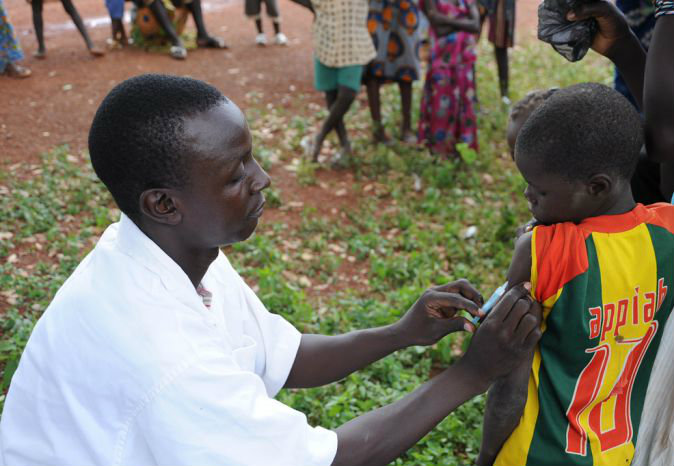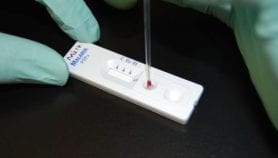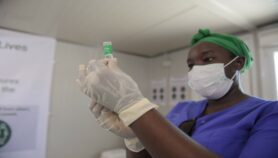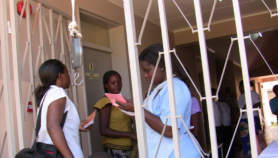By: Dorcas Odhiambo
Send to a friend
The details you provide on this page will not be used to send unsolicited email, and will not be sold to a 3rd party. See privacy policy.
[NAIROBI] A conjugate vaccine has led to control and near total elimination of meningitis A disease in Africa, according to studies.
The findings are from a collection of 29 articles written by guest editors from Public Health England and the former Meningitis Vaccine Project, a partnership between the World Health Organization (WHO) and the international health non-profit PATH.
Results from the studies published in the Clinical Infectious Diseases journal this month (10 November) show that MenAfriVac® vaccine, has nearly eliminated the disease in Africa’s “meningitis belt.”
“Wherever the vaccine has been introduced, meningitis A cases have virtually disappeared.”
Steve Davis, PATH
According to Marie-Pierre Preziosi, a vaccines specialist at the WHO, the researchers used a mathematical modelling with a wide range of data collected from previous epidemics, MenAfriVac® vaccine campaigns in Burkina Faso, its clinical trials, and other data about disease and immunisation in Africa.
“We then applied several different long-term vaccination scenarios to this model and determined the best strategy for how countries might wish to implement this vaccine going forward,” Preziosi tells SciDev.Net.
Their strategy, according to Preziosi, predicted long-term protection into national immunisation programmes for children aged 9 to 18 months, no later than five years after the initial mass campaigns in people aged 1 to 29 years, with a catch-up campaign on unvaccinated children born since the initial campaign.
Mark Alderson, the director of PATH’s polyvalent meningococcal vaccine project says meningitis, an infection of the thin lining surrounding the brain and spinal cord, can cause severe brain damage, hearing loss or learning disabilities and is fatal in 50 per cent of cases if untreated.
But the scientists are warning that the disease’ resurgence is likely in 15 years if the vaccine is not incorporated in routine immunisation programmes in the belt countries.
“If there is no effort to incorporate the vaccine into routine immunisation programs, our model predicts that meningitis A epidemics will come back in force after approximately 15 years,” Preziosi says, adding that the vaccine has so far been introduced in 16 countries out of the 26 in the “meningitis belt” stretching from Senegal to Ethiopia.
Burkina Faso was one of the very first countries to introduce the vaccine nationwide, in 2010, and has generated a wealth of information, experience and lessons that benefited other belt countries.
Preziosi says the findings show that vaccination is cost-saving, prevents major disruption of health services when meningitis epidemics occur. She urges African governments to use the scientific data generated to make informed decisions about whether to include this vaccine in national childhood immunisation programmes.
Steve Davis, President and CEO of PATH says wherever the vaccine has been introduced, meningitis A cases have virtually disappeared “in contrast to previous years when the region was prone to meningitis A epidemics.”
During 1996 and 1997, he explains, the largest epidemic ever hit Africa, overwhelming health systems with 250,000 cases and 25,000 deaths.”
Ifedayo Adetifa, a consultant paediatrician and infectious diseases epidemiologist with Kenya-based Kilifi KEMRI-Wellcome Trust Research Programme, says development of a meningococcal vaccine for Africa is now a proven concept.
The vaccine effectiveness, he tells SciDev.Net, is demonstrated through direct benefit to recipients and indirectly in unvaccinated populations through induction of herd immunity.
“If coverage rates in mass vaccination campaigns remain high, Meningitis A outbreaks can become history in the present generation aged 2-35 years,” Adetifa says, adding, that there is need for enhanced surveillance where this vaccine is used and for the entire Africa to detect outbreaks due to related bacteria that may replace Meningitis A following its widespread use.
Adetifa says stockpiles should be available for mass campaigns and policy makers need to support vaccination interventions and equitable access to vaccines, especially for the poor and vulnerable.
This piece was produced by SciDev.Net’s Sub-Saharan Africa English desk.
References
The Meningitis Vaccine Project: The Development, Licensure, Introduction, and Impact of a New Group A Meningococcal Conjugate Vaccine for Africa Volume 61 suppl 5 (November 15, 2015)














